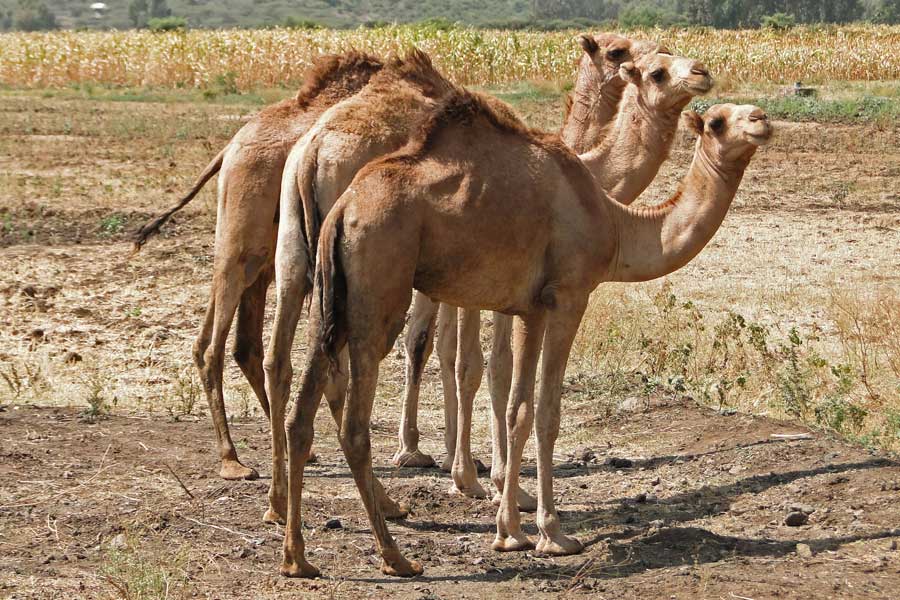
Mar 13 , 2021
By Christian Tesfaye
President John F. Kennedy famously asked Americans to ask what they can do for their country, not vice-versa. It was meant to inspire people to rise above what they cannot be bothered to recognise, that they are a part of the problem, and work to improve it. But history has not traveled down that route, for the most part.
It makes sense. People pay their taxes and allow those with state power to make laws on their behalf.
Why should it be them that so much is expected of? Why not the government?
The COVID-19 pandemic has driven the point across. People across the world collectively asked what their governments will do for them. The actions of some, like Brazil and the United States, made it apparent that there was not much that could be done. At least not in the beginning. Governments in South Korea, Taiwan, and even China astonished the world in their response to saving lives.
The pandemic is subsiding for the rich world as their population gets vaccinated against the virus, but governments continue to ask what they can do for their people. Across the Atlantic, in the "land of the free," not to mention capital, there is a familiar answer – money. Just give people checks amounting to 1,400 dollars.
Let us take a moment to appreciate this. The government sends most adults about 56,000 Br to spend as they wish. It is a third round of stimulus checks with the first and second rounds amounting to 1,200 dollars and 600 dollars, respectively. This is lightyears removed from the time monarchs levied taxes and tributes because, well, they were monarchs. It was not to build roads, schools or buy grain if farmers were having a bad season. Taxes were employed to pay soldiers for wars, keep the clergy satisfied and fund the monarch's lavish lifestyle. Public policy was much less complex in those days.
Now, in the US, the government gives money to citizens that are struggling as a result of the economic downturn. On top of stimulus checks, unemployment benefits will be increased, and rental and food assistance will be ramped up, costing the government 1.9 trillion dollars.
In much of the developed world, the United States is not considered that much of a social welfare country, at least not compared to those in Europe. From health care to education, the government covers much of it in an astounding Bismarckian push to redistribute wealth.
The story is very different in countries such as ours. Much of this dynamic was best portrayed in the YouTube series Economics Explained, on a video titled, “How The Dutch Economy Shows We Can't Reduce Wealth Inequality With Taxes.”
“I would rather be in the bottom 10pc of the Netherlands … than the top 10pc of Ethiopia,” the narrator said.
This was much more a discussion on social mobility, which is heavily restricted in Ethiopia. There is no denying that the country is growing. It is quite astonishing that the International Monetary Fund (IMF) finds that the economy will continue to expand this year despite a significant political crisis and slowdown in business activity.
Still, when a once in a century pandemic came, there was not much the government could do. Even when modern science progressed to a point where a vaccine could be developed within a year, Ethiopia is reduced to appealing to rich countries' better nature not to leave us in the dust of their success.
What this country has to offer us in huge doses is instead endless types of nationalisms and the promise of national or ethno-national greatness. All we seem to expect is not effectiveness or a government able to provide its people with basic needs and services but avoidance of a complete breakdown of the state and society, as in Yemen or Somalia. This is our standard.
We have stopped asking what our country can do for us. We keep being asked what we can do for it.
PUBLISHED ON
Mar 13,2021 [ VOL
21 , NO
1089]


Fortune News | Jul 15,2023

Radar | Aug 04,2024

Commentaries | Jan 04,2020

Fortune News | Jun 26,2021

Fortune News | Aug 22,2020

My Opinion | 131673 Views | Aug 14,2021

My Opinion | 128039 Views | Aug 21,2021

My Opinion | 126001 Views | Sep 10,2021

My Opinion | 123622 Views | Aug 07,2021

Dec 22 , 2024 . By TIZITA SHEWAFERAW
Charged with transforming colossal state-owned enterprises into modern and competitiv...

Aug 18 , 2024 . By AKSAH ITALO
Although predictable Yonas Zerihun's job in the ride-hailing service is not immune to...

Jul 28 , 2024 . By TIZITA SHEWAFERAW
Unhabitual, perhaps too many, Samuel Gebreyohannes, 38, used to occasionally enjoy a couple of beers at breakfast. However, he recently swit...

Jul 13 , 2024 . By AKSAH ITALO
Investors who rely on tractors, trucks, and field vehicles for commuting, transporting commodities, and f...

Jun 28 , 2025
Meseret Damtie, the assertive auditor general, has never been shy about naming names...

Jun 21 , 2025
A well-worn adage says, “Budget is not destiny, but it is direction.” Examining t...

Jun 14 , 2025
Yet again, the Horn of Africa is bracing for trouble. A region already frayed by wars...

Jun 7 , 2025
Few promises shine brighter in Addis Abeba than the pledge of a roof for every family...

Jun 29 , 2025
Addis Abeba's first rains have coincided with a sweeping rise in private school tuition, prompting the city's education...

Jun 29 , 2025 . By BEZAWIT HULUAGER
Central Bank Governor Mamo Mihretu claimed a bold reconfiguration of monetary policy...

Jun 29 , 2025 . By BEZAWIT HULUAGER
The federal government is betting on a sweeping overhaul of the driver licensing regi...

Jun 29 , 2025 . By NAHOM AYELE
Gadaa Bank has listed 1.2 million shares on the Ethiopian Securities Exchange (ESX),...